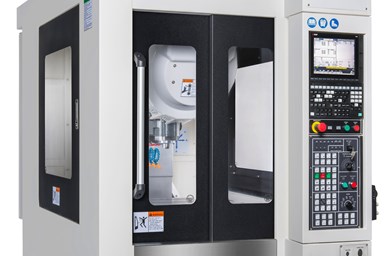More Machining in Less Space
Ganesh T500 vertical machining centers offer fast machining capabilities in a very compact machine.
Share





Some managers may not think much about it, but it is very common practice to cut small parts on much larger machines than necessary. That’s a waste of floor space, which can be a legitimate cost factor, and can slow cycle times with more distance to travel between tool changes. Expand Machinery (Chatsworth, CA) has an answer for that with its Ganesh T500 vertical machining center. The company says that while a typical 40” x 20” milling machine consumes almost 90 square feet of shop space the T500, which is just 50” wide, takes up only one third of that space.
Shops may well need the larger machines for some of their work, but small workpieces could be machined much more efficiently on the smaller and low cost T500. With faster spindle acceleration and deceleration, shorter rapid distances, much faster rapid rates, high-speed machining capability, and the ability to rigid tap at 6,000 RPM, the T500 is more productive and economical. The 12,000 RPM direct-drive spindle coupled with a 2,362 rapid traverse rate greatly reduce non-cutting time.
The 20” X 17” table can handle 6 power vises for high production work and features a 21-tool ATC with a very fast tool-to-tool change time of 1.6-second. When dealing with smaller work, the savings potential available to of using this fast and compact machining platform can be substantial. Moreover, right now Expand has a special offer going on a showroom model at a reduced price.
Related Content
-
Where Micro-Laser Machining Is the Focus
A company that was once a consulting firm has become a successful micro-laser machine shop producing complex parts and features that most traditional CNC shops cannot machine.
-
How to Successfully Adopt Five-Axis Machining
While there are many changes to adopt when moving to five-axis, they all compliment the overall goal of better parts through less operations.
-
Lean Approach to Automated Machine Tending Delivers Quicker Paths to Success
Almost any shop can automate at least some of its production, even in low-volume, high-mix applications. The key to getting started is finding the simplest solutions that fit your requirements. It helps to work with an automation partner that understands your needs.





















